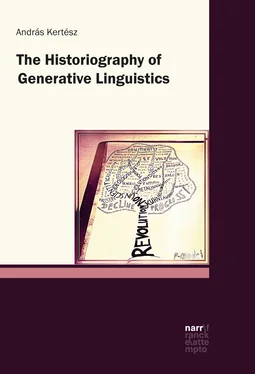MurrayMurray, Stephen O.’s solution to (P) is (the following):
| (SP10) |
The basic terms of the historiographyhistoriography of generative linguistics, with respect to Syntactic Structures Syntactic Structures are ›revolutionaryrevolutionary rhetoric‹rhetoric and ›coup‹coup, its central hypothesis is (T10) and its framework is the sociologicalsocial theorytheory based on GriffithGriffith, Belver and MillerMiller, A.J. (1970) and Griffith and MullinsMullins, Nicholas C. (1972), rooted in the critique of KuhnKuhn, Thomas S. (1970) [1962]. |
2.1.2.6.2 Revolutionary rhetoricrhetoric and linguistics warslinguistics wars
Randy Allan HarrisHarris, Randy Allen’ book (1993a) provides an unvarnished account of the cruelty of the ›linguistics warslinguistics wars‹. It gives a detailed analysis of the wars triggered by the generativists against neo-Bloomfieldianneo-BloomfieldianBloomfieldian linguists, the competition between interpretive and generative semanticists, the pragmatic turn related to generative semanticssemanticsgenerative in the 1970s and the unfolding of the Theory of Government and BindingGovernment and Binding, Theory of. Nonetheless, the manuscript was finished before the publication of the Minimalist ProgramMinimalist Program. The impact of the book exceeded the tight boundaries of both linguistics and the historiographyhistoriography of linguistics. On the one hand, it instilled the term ›linguistics wars‹ in the public mind by reaching a relatively wide range of readers due to its style (which JosephJoseph, John E. 1995: 397 called »jaunty«). On the other hand, several of its main characters were active at the time of its publication, and many of them, the heroes of the battles between interpretive and generative semantics as well as members of the younger generation of the generativists, are still active. ChomskyChomsky, Noam, for instance, completely rejects the picture Harris paints of the historyhistory of generative linguistics in the interview given to GrewendorfGrewendorf, Günther.1 He expresses a similar view when interviewed by BarskyBarsky, Robert F. in that he describes Harris’ story as belonging to the world of fantasy (Barsky 1998: 56, 151). Barsky (1998: 56) evaluates Harris’ work as Foucaultian historiography (in agreement with Chomsky, cf. Grewendorf 1994: 301), which provides a psycho-socialsocial explanation for the changes surfacing in the research while emphasizing the power struggle between the participants. According to TomalinTomalin, Marcus (2008: 14), Harris’ work, because of its popular style, cannot be taken seriously, either. In contrast, Joseph (1995) does not question that Harris’ book is a competent contribution to historiography, nor does LangendoenLangendoen, D. Terence’s review (1995), although they criticize it in different respects.
Similarly to MurrayMurray, Stephen O. (1994), HarrisHarris, Randy Allen attributes the success of generativism not to a scientific revolution, but to revolutionaryrevolutionary rhetoricrhetoric.2 Unlike Murray, however, he does not use the term ›coupcoup‹. He does not develop an explicit historiographicalhistoriography framework, either, although his approach is close to the postmodern streams of the philosophy and historiography of science which explain the content of scientificscientific knowledge by referring to psychological and sociologicalsocial factors. We reconstruct the main thesis of the book in the following way:
| (T11) |
After the publication of Syntactic Structures, Syntactic Structures Chomsky’Chomsky, Noams group started a ›linguistics war‹ against neo-Bloomfieldiansneo-Bloomfieldian and won it by applying rhetoricalrhetoric means. |
The following considerations yield (T11).
First of all – in agreement with the claims made by NewmeyerNewmeyer, Frederick J. (1986a: 1; 1986b: 7, footnote 6), MurrayMurray, Stephen O. (1994) and KoernerKoerner, E.F. Konrad (1989, 2002, 2004) which we have already cited – American structuralismstructuralism was not in a KuhnianKuhnian crisiscrisis when and after Syntactic Structures Syntactic Structures was published. For this reason, one of the prerequisites of Kuhnian revolutionrevolutionKuhnians is not met. HarrisHarris, Randy Allen (1994: 35–37) demonstrates – through the examples of TragerTrager, George L. and SmithSmith, Henry Lee (1957) [1951] and Zellig S. HarrisHarris, Zellig S. (1951) – that in the 1950s »not the slightest hint of frustration at the BloomfieldianBloomfieldian program« could be noticed and »there is little indication in the literature of the period that there was a crisis on any front« (HarrisHarris, Randy Allen 1993a: 36). Therefore, he concludes that »measured dissent, pluralismpluralism, and exploration […] represent the exact opposite of KuhnKuhn, Thomas S.’s definition of crisis« (Harris 1993a: 37; emphasis added).
Second, and also in harmony with MurrayMurray, Stephen O.’s (1994) and KoernerKoerner, E.F. Konrad’s (1989), (2002), (2004) views, but opposing NewmeyerNewmeyer, Frederick J.’s (1986b), HarrisHarris, Randy Allen claims that there is continuitycontinuity between Syntactic Structures Syntactic Structures and neo-Bloomfieldianneo-BloomfieldianBloomfieldian linguistics. He stresses that in the 1950s most linguists conceived of Syntactic Structures mainly as the propagation of Zellig S. HarrisHarris, Zellig S.’ theories and that ChomskyChomsky, Noam’s program appeared to be a consistently improved version of neo-Bloomfieldianism (Harris 1993a: 37, 39).
Third, similarly to MurrayMurray, Stephen O. (1980), (1994), (1999), HarrisHarris, Randy Allen believes that it was ChomskyChomsky, Noam who turned against his adherents by destroying the optimistic atmosphere of peaceful development.3
Finally, according to HarrisHarris, Randy Allen, ChomskyChomsky, Noam and his followers did not apply substantial arguments against the claims of neo-Bloomfieldianneo-Bloomfieldians and later those of generative semanticists by responding to arguments with arguments. Rather, they based their argumentation on humiliating and ridiculing their opponents in the debate with the help of rhetoricalrhetoric tools. Chomsky’s opinion reflected his contempt for those whose views differed from his and he continuously emphasized that except for himself and his small circle »virtually everyone else in linguistics is intellectually and emotionally and even morally callow« (Harris 1993a: 78) and thus not suited to conduct scientificscientific research. Harris (1993a: 61, 69–73) provides a compelling description of the rhetorical arsenal reflecting the »missionary zealmissionary zeal«, with which Chomsky’s adherents led their war against neo-Bloomfieldians. In order to provide a coherent description of Harris’ view, we have to mention that at this point – although this refers to a later stage in generative linguistics – according to Harris, the development of Chomskyan generative linguistics after Aspects Aspects was not motivated by intellectual goals with respect to Chomsky’s reaction to the appearance of the generative semanticists (see also Harris 1993c). Rather, it was motivated by his objective of retaining power: »Attacking generative semanticssemanticsgenerative […] occupied virtually all of his linguistic energies for several years« (Harris 1993a: 143).4 Harris discusses a number of episodes in retrospect and demonstrates the alleged intrigues and rhetorical tools which Chomsky and his immediate circle used to achieve this goal (Harris 1993a: 135–197; see also 1993b, c). Harris (1993a: 160–161) considers three of these as especially effective: Chomsky’s ad hominemad hominem and straw man arguments as well as his vagueness, which he himself frequently chose to employ while at the same time reproaching his opponents for that very fault.5
Читать дальше












